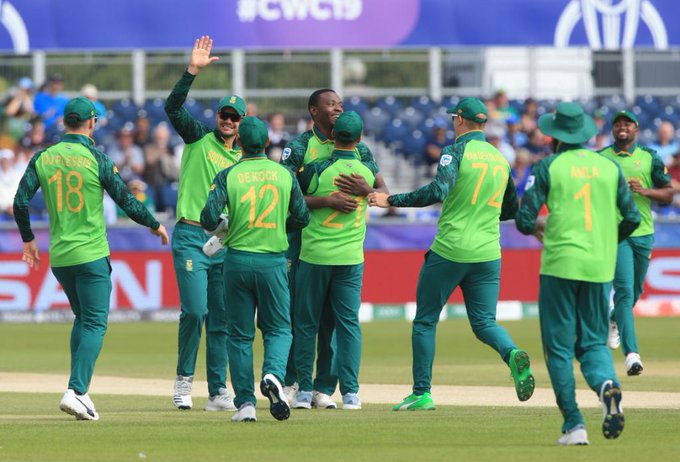The minor success against Sri Lanka should be remembered in the context of a major World Cup failure, writes JON CARDINELLI.
Imagine the match at Chester-le-Street marked the Proteas’ first game of the 2019 World Cup.
Think about how South Africa performed over the course of this contest. Think about how different their campaign may have been if they had played Sri Lanka and possibly Afghanistan in the early stages of the tournament.
Everything went according to plan for the Proteas at Chester-le-Street. Faf du Plessis won the toss and put Sri Lanka in to bat on a seam-friendly wicket. Kagiso Rabada struck with his first ball, although a tentative Dimuth Karunaratne played a big part in the dismissal.
LEMKE: Job done as Proteas brush aside Sri Lanka
The Proteas eventually dismissed Sri Lanka for 203. Hashim Amla applied himself to set South Africa up for a big win. The skipper showed similar composure during the early stages of his innings and then cut loose like the Du Plessis of old.
How different it may have been if the Proteas had begun their campaign with that kind of performance. All the talk right now would be about the Proteas’ tendency to lose playoff matches, rather than their failure to qualify for the knockout rounds entirely.
But cricket, much like life, doesn’t work like that.
Rarely does a team tick the boxes as the Proteas did in the game against Sri Lanka. Rarely does an opponent – at least a side with serious title ambitions – roll over like Sri Lanka did on Friday.
The Proteas knew what they were in for at the start of the tournament. They knew that they would have to play three games – two of those against hosts England and favourites India – in the first week of their campaign.
PLAYER RATINGS: All smiles for ruthless Proteas
It was always going to be a challenge. It was always going to show where this team stood in the grand scheme of things, with performances speaking to their position as much as results.
The Proteas came up against combative England and India sides. They found themselves in a dogfight with a spirited Bangladesh outfit.
The record will show that they failed those early tests of mettle and did not recover until late in the campaign, in other words when all the pressure had eased and it was too late to qualify for the matches that truly matter.
Gary Kirsten used to talk about pressure management when he was coaching the Proteas in 2012 and 2013. The team was immensely successful during that period, especially at Test level where they secured monumental series wins in England and Australia.
Kirsten liked to talk about a team absorbing pressure in a time of crisis. Slowly the team would fight its way back from the brink. When the moment was right, it would transfer the pressure back on to the opposition and eventually deliver the killing blow.
That mentality has been sadly lacking in Ottis Gibson’s team. When they’ve been squeezed at this World Cup, they cracked.
The early part of the campaign was always going to make or break South Africa. The side failed to respond to the pressure and was duly crushed. It was an early sign of the team’s inability to push back.
The win and performance against Sri Lanka will be welcomed by punch-drunk South African fans who’ve had to endure one sporting disaster after another. A win against Australia in the final round-robin game would be similarly well received.
However, the Proteas and Cricket South Africa are kidding themselves if they think that two wins at the back end of the campaign are going to compensate for an early World Cup exit.
There’s no point lamenting a tough schedule. There’s no sense in contemplating what-if scenarios.
The Proteas haven’t been good enough at this tournament, not even good enough to make up the numbers in the final four. The reasons for such gross underperformance – and realistic solutions – need to be found sooner rather than later.
Everybody involved needs to remember this campaign in its entirety. Declaring the win against Sri Lanka a sign of progress and the earlier losses an aberration would do the side more harm than good in the long run.
Whatever happens from here, the powers that be cannot allow this cycle to start again.
Photo: Cricket World Cup/Twitter







